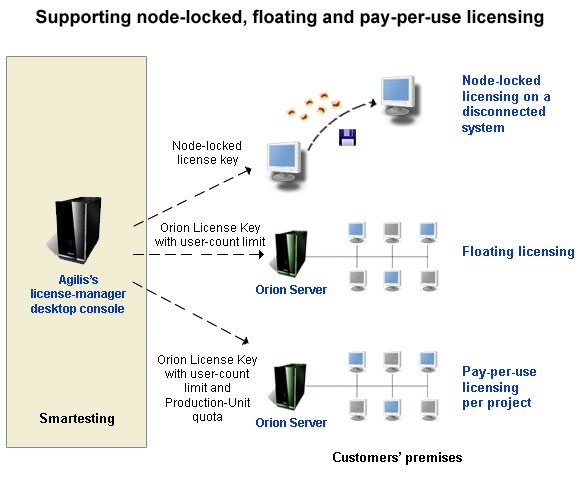Subscription and Metered Licensing Case Study: Smartesting
Smartesting is a French company based in Paris, with offices in Boston and Bangalore. Smartesting provides solutions for automating the testing of IT systems to a worldwide customer base, which includes both system integrators working on behalf of end-users, and large IT-system end-users such as banks.
Smartesting had employed a widely-used commercial licensing system to offer floating licensing, but wanted to expand their licensing to include node-locking and a pay-per-use license model. They evaluated the commercial market options and decided Agilis provided the best fit for their entire range of licensing requirements, including the floating licensing they already offered. Arnaud Bouzy, Product Manager for Smartesting, noted: ‘Agilis supported all our planned license models ‘out of the box’, and their multiplatform Java client library supports our strategy of developing on Linux and delivering on the Windows platform. The integration was straightforward, with Agilis Support providing prompt, practical guidance whenever we had a question”.
Smartesting offers three different license models. In all these models the license manager also controls which edition is enabled: Basic or Enterprise.
Node-locked licensing
In this scenario a license is locked to a specific machine, and once activated continues to run on this machine standalone. Smartesting’s users are in development environments where there is no direct external network communication from the target systems, so automatic network-based activation is not possible. Smartesting therefore uses Agilis’s license-manager desktop console to generate a key file that encrypts the node-locking parameters and the license time limit. The key file is then sent to the customer by email for transfer to the target system.
Arnaud Bouzy commented: “Agilis’s key-based approach allows us to provide a convenient, flexible licensing model to our customers with offline systems. We use this same model for issuing time-limited trial licenses to prospective customers”.
Floating licensing
Some customers prefer the flexibility of sharing a set number of licenses between a larger number of internal users over time. Agilis’s Orion Server is installed on the customer’s premises, and manages the set number of licenses over their internal network. Only one Orion license server is required to manage licenses over the customer’s entire worldwide WAN / VPN / intranet.
Arnaud Bouzy notes: “Floating licensing is widely used for engineering systems such as ours, but our customers really don’t care what license server we use – Orion installs easily, and runs reliably, so they are happy. The only issue we had was when one customer mistakenly changed the system clock on the machine running the license server. The server correctly stopped running as the built-in clock-tamper detection mechanism had detected the change, but since this was a legitimate mistake it was quickly and easily resolved”.
Pay-per-use Licensing
This model is used by Smartesting’s system-integrator customers. The Orion Server is installed on their premises. The customer purchases a number of hours, or ‘Production Units’, of actual elapsed-time usage of the Smartesting system; this is managed in Orion using the built-in quota system. As the users work with the Smartesting application their hours of actual usage are deducted from the inventory of Production Units in the Orion Server, with the Orion warning-threshold mechanism automatically alerting them when the inventory of Production Units is down to a set level. On receipt of the warning the customer can purchase more Production Units from Smartesting to ensure no interruption in their ability to get their job done.
To deliver the initial inventory of Production Units, or to upgrade a customer with additional Production Units, Smartesting use Agilis’s license-manager desktop console to generate an encrypted Orion License Key, which is emailed to the customer, who then just loads it into the Orion Server. One Orion Server can also manage several different pools of Production Units, which are used on different projects within the same system integrator.
Arnaud Bouzy said their customers welcomed this new approach: “Our system integrator customers love the pay-per-use model supported by Orion because they can assign Production Units to different projects, making tracking costs per project a trivial exercise. If they had instead purchased a perpetual license they would have a complex costing problem when billing each end-customer. Also, the entry cost is low, so they reduce their risk, and pay-per-use means they avoid wasting money on unused ‘shelfware’”.

In the floating and pay-per-use scenarios the Orion Server is installed on the customers’ premises. The Orion Server does come with a built-in general-purpose web-based user interface, but this was more than Smartesting needed, so they quickly built a custom UI using the Orion Java administration APIs. This UI allows the customers just to load the Orion License Key to enable their licenses, and for the pay-per-use customers it also allows them to report on their Production Units.
Agilis meets all Smartesting’s current and planned needs. “Agilis supports all our requirements – node-locked, floating and pay-per-use – with one licensing solution and low operations costs. We are very satisfied with their flexibility, stability and security”, said Laurent Py, CEO of Smartesting.
